In 2024, Customer Relationship Management (CRM) software has become an essential tool for businesses of all sizes.
Studies show that 74% of businesses reported an increase in sales productivity after implementing a CRM system. This highlights the importance of choosing the right CRM to suit your business needs.
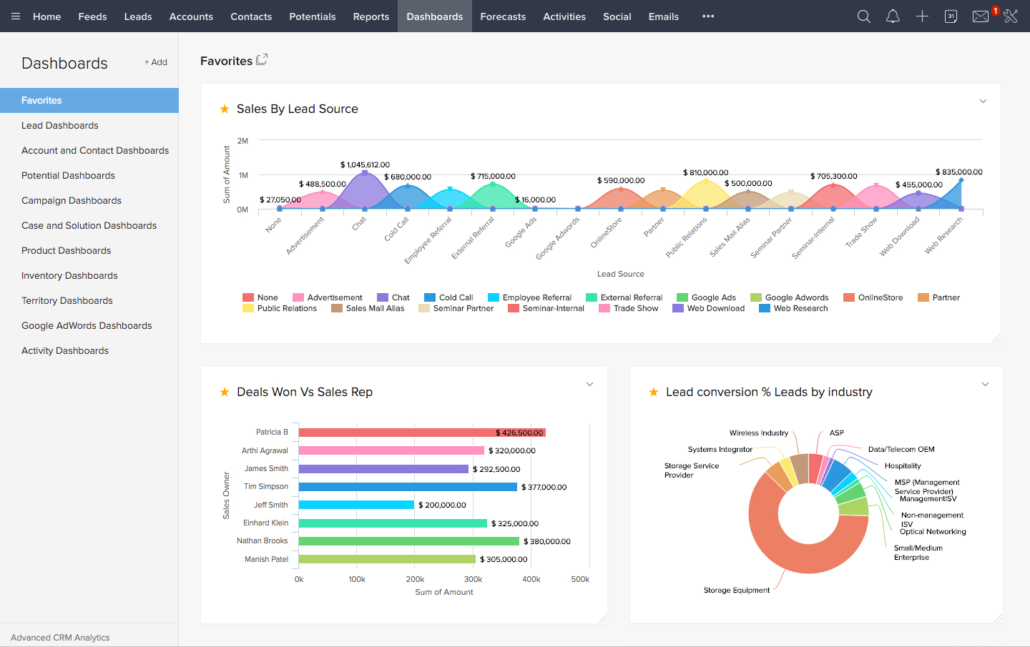
Zoho CRM is a popular option, but there are many alternatives that may offer better features, customization, and value for your specific requirements. Whether you’re a startup seeking a user-friendly solution or a seasoned business requiring advanced features, there’s a perfect CRM fit waiting to be discovered.
Read on to discover the best Zoho alternatives for 2024. We’ll highlight their key features, pricing structures, and unique strengths to help you find the perfect CRM solution for your business.
Top 10 Best Zoho Alternatives for 2024
(Please note, since the number of reviews for each product is inconsistent, the average rating column is just to give you an idea of customer perceptions.)
| Zoho Alternatives | Popular for | Average Rating on Gartner, Capterra, and G2 | Pricing |
| LeadSquared | Ease of use, Pricing, Scalability, and No-code Automation | 4.4 | Lite – $25 per user/month Pro – $50 per user/month Super – $100 per user/month |
| Salesforce | Analytics and Business Intelligence | 4.2 | Essentials – $25 per user/month Professional – $75 per user/month Enterprise – $150 per user/month Unlimited – $300 per user/month |
| HubSpot | Ease of use, APIs, and Customizable Platform | 4.5 | Free – $0 per month Starter – $45 per month Professional – $450 per month Enterprise – $1200 per month |
| Pipedrive | Managing leads, Creating Pipelines, and Nurturing Campaigns | 4.3 | Essential – $9.90 per user/month Advanced – $19.90 per user/month Professional – $39.90 per user/month Enterprise – $59.90 per month |
| Freshsales | Customer Support, Ease of use, Automation and Flexibility | 4.6 | Free – $0 per user/month Growth – $29 per user/month Pro – $69 per user/month Enterprise – $125 per user/month |
| Agile CRM | SMB CRM, Functionality, and Customizability | 4.1 | Free – $0 per user/month Starter – $8.99 per user/month Regular – $29.99 per user/month Enterprise – $47.99 per user/month |
| Scoro | Customizability, User-Interface, and Ease of Use | 4.3 | Essential – $26 per user/month Standard – $37 per user/month Pro – $63 per user/month Ultimate – not disclosed |
| Apptivo | Sales Planning, Unlimited Storage, and Ease of Use | 4.5 | Lite – $10 per user/month Premium – $15 per user/month Ultimate – $25 per user/month Enterprise – custom pricing |
| Insightly | SMB CRM, Functionality, and Customizability | 4.2 | Plus – $29 per user/month Professional – $49 per user/month Enterprise – $99 per user/month |
| Bitrix24 | Managing Tasks, Telephony, Building Websites and Analytics | 4.1 | Free – $0 per user/month Basic – $61 per 5 users/month Standard – $124 per 50 users/month Professional – $249 per 100 users/month Enterprise – $499 per 250 users/month |
1. LeadSquared
LeadSquared, an up-and-coming sales execution CRM, is emerging as one of the best CRMs in the industry, popular for its lead management, sales process and marketing automation, and out-of-the-box integrations.
It is also SOC-2, GDPR, and HIPAA compliant, making it an excellent choice for healthcare industries and other businesses that want their contact information to stay secure.
What makes LeadSquared a good Zoho alternative?
With a 4.4 average on G2, Capterra, and Gartner, LeadSquared is better suited for businesses looking for sales and marketing management software.
One of the most significant advantages of LeadSquared is that it is easy to learn and fast to implement. As Sunil puts it on Capterra, one of the reasons he chose LeadSquared over other CRMs like Zoho was the “ease of use & the excellent customer support.”
Another advantage of LeadSquared is that its lead management features are excellent and have been liked by a lot of people in the review platforms, including Irfanudeen S, who said that he would “recommend LeadSquared for those who need to organize, manage, categorize the assigned leads.”
Price
Compared to Zoho, LeadSquared is a bit pricier and does not provide a free trial. However, with the extensiveness of the CRM’s features, the price is definitely worth it. You can either check out their pricing page or get an idea of the pricing structure below.
- Lite – $25 per user/month
- Pro – $50 per user/month
- Super – $100 per user/month
Cons
Although LeadSquared has features that Zoho doesn’t, like SMS Marketing, it lacks a ticket system, one of Zoho’s most vital tools. So, if you are looking for a CRM to help raise and manage your tickets, LeadSquared may not be the best choice. However, LeadSquared does provide integrations with ticketing systems like Zoho and Zendesk.
Another common issue with the platform is that the servers are notorious for being slow at times. However, since this company is still young, this issue will likely be resolved soon.
If you are looking for a CRM that is easy to implement and has a short learning period, LeadSquared is an excellent choice for any industry your business may be in.
2. Salesforce
If you haven’t heard of Salesforce when you hear of CRMs, then you must be living under a rock. Salesforce offers to help businesses improve their customer relationships through sales, marketing, and commerce tools. Starting as a sales CRM, this company provides exceptional and in-depth sales features for enterprises to improve their efficiency.
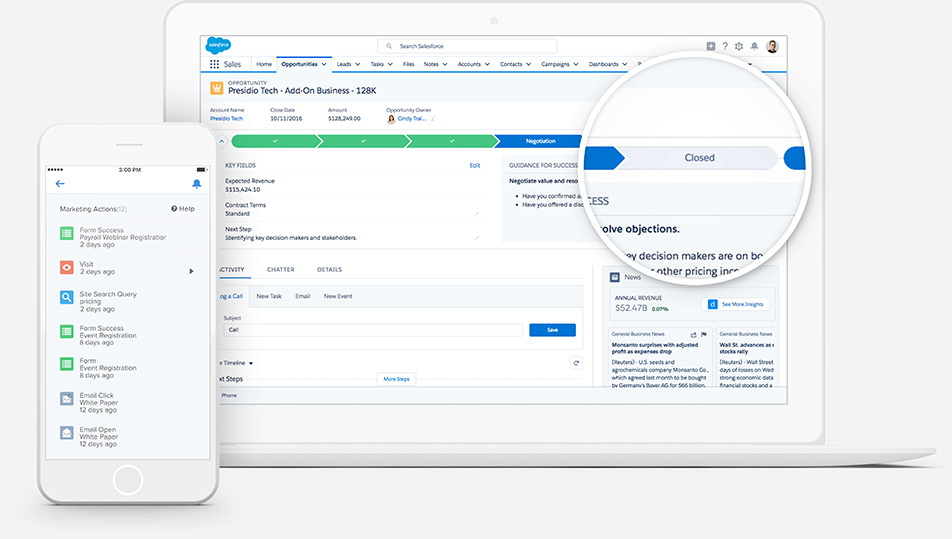
What makes Salesforce a good Zoho alternative?
This CRM is rated an average of 4.4 on Gartner, G2, and Capterra.
One of the most significant advantages of Salesforce is how the information is presented. In-depth analytical reports are presented to users in the form of graphs and lists. Reports are available for each of its tools separately. On the other hand, Zoho combines its sales, service, and marketing tools to generate a generic report.
Another thing you cannot take away from this CRM is its number of features. As one reviewer put it on Gartner, Salesforce is a “Master in terms of Feature and Flexibility.”
Price
Salesforce is expensive when compared to Zoho. You can either check out their pricing page or refer to the structure below –
- Essentials – $25 per user/month
- Professional – $75 per user/month
- Enterprise – $150 per user/month
- Unlimited – $300 per user/month
Cons
A big disadvantage of the CRM is its long learning periods. A customer wrote in reviews on G2 that “This software can be complex and cumbersome depending on how it is set up.”
If you are looking for a cost-effective CRM, then be warned, for Salesforce is NOT cheap. In fact, Zoho’s most expensive pricing is still cheaper than Salesforce’s second-cheapest package, which resonates with a small business owner’s review on G2, who said, “Salesforce is pricey.”
If you are a small business, then you might not find suitable solutions with Salesforce that would fit you. On the other hand, if you are a big enterprise requiring many features, this CRM is a solid option to consider. But before deciding to invest in Salesforce, there are some more alternatives you should consider.
3. HubSpot
Hubspot is another all-in-one CRM that provides tools in sales to manage, communicate, and track leads; in marketing, to track ads, engage with customers on socials and manage your social media; and in customer service to help provide a better user experience.
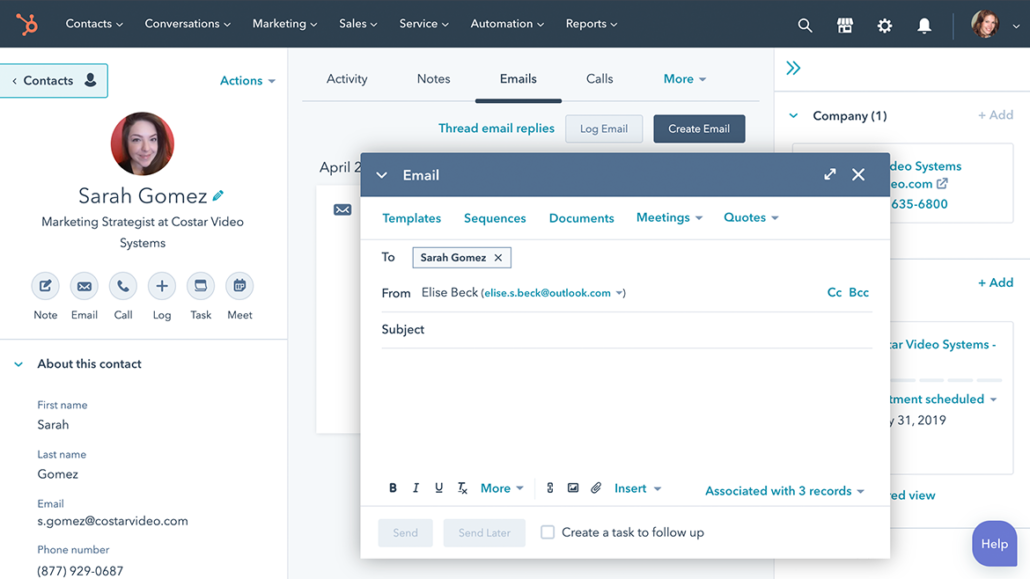
What makes HubSpot a good Zoho alternative?
With an average rating of 4.5, HubSpot is extremely simple to use with a concise learning period. As Saya K., a small business owner, put it on Capterra, HubSpot is “Easy to learn and effective to use.”
Another great advantage is that it is solid all round, not just in one aspect. It has a decent number of integrations, email marketing templates, and reporting capabilities. These reviews resonate with Patrick’s on Capterra, with his statement of “What’s not to like!” about HubSpot.
Price
HubSpot does offer a free product with unlimited usage but has minimal functionality and features. You can either check out their pricing page or refer to the structure below –
- Free – $0 per month
- Starter – $15 per user per month
- Professional – $1080 per month
- Enterprise – $4000 per month
Cons
If you are a business that is looking to scale up, then HubSpot may not be the best for you, as one review on G2 talks about how because of the 500 emails limit in plans.
Although it is an all-in-one CRM, HubSpot was primarily built for marketing. If you are looking for solid features in sales, then this CRM might not have all the functionalities your reps need to improve their efficiency. As a reviewer on G2 put it, “the platform is more geared to marketers.”
Overall, if you are looking for a marketing CRM that also provides basic sales functionalities, this is certainly a CRM you should consider investing in.
4. Pipedrive
One of the most popular CRMs for pipeline management, Pipedrive allows users to track leads, organize your pipeline, and keep your sales team on track all in one place. It is commonly dubbed as the CRM that is “made by salespeople, for salespeople.”
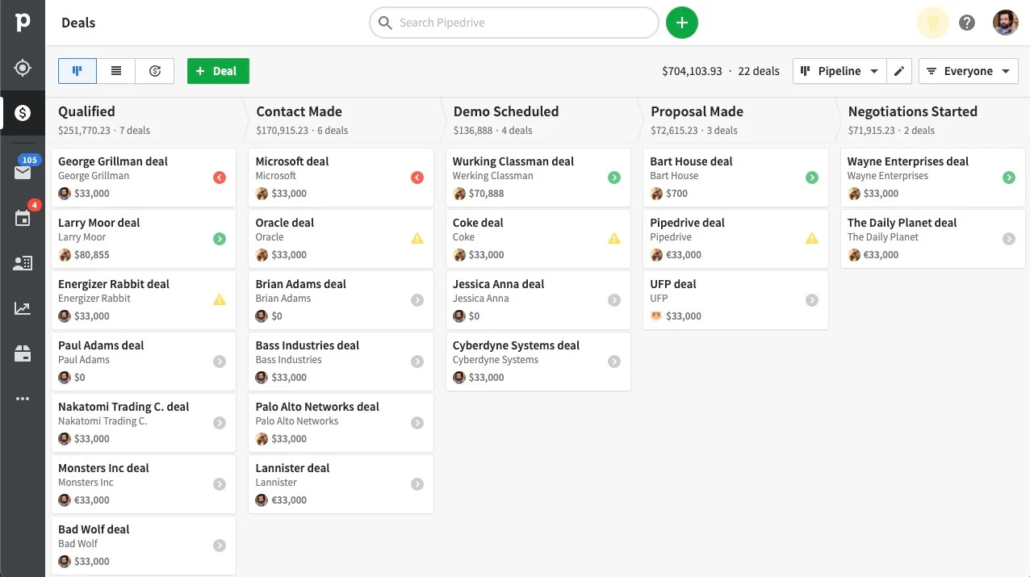
What makes Pipedrive a good Zoho alternative?
With an average rating of 4.2 on G2, 4.5 on Capterra, and 4.3 on Gartner, one of the biggest reasons Pipedrive is a good alternative is the fact that its user interface is much cleaner and simpler to use than Zoho.
Another great thing about Pipedrive is that it is a robust CRM, and although it is built for sales teams, it is pretty great for marketing teams as well.
Price
They have four different pricing tiers. One of the obvious restrictions of each price package are the number of reports you can generate, which are 15, 30, 150, and limitless. You can check out either their pricing page or refer to the following structure:
- Essential – $12 per user/month
- Advanced – $24per user/month
- Professional – $49 per user/month
- Power – $59 per month
- Enterprise- $79 per month
Cons
One of the obvious disadvantages of Pipedrive CRM is its reports. Apart from having a limited number of reports for each package, the CRM also has limited customizability in terms of report generation and is known to be difficult to download and export.
Their customer support is another aspect that leaves a lot to be desired. As Holden on G2 wrote in his reviews, Pipedrive is a “Great product marred by terrible customer support.”
If you are not too bothered by hindrances in reporting or having excellent customer support, then this CRM is a great choice to consider.
But wait! If you have decided to finalize Pipedrive, then here are some more alternatives you need to check out.
5. Freshsales
Freshsales is a cloud-based CRM business that primarily manages connections with current and prospective clients. Their CRM includes event tracking, deal management, advanced reporting, and a built-in phone and chat facility.

What makes Freshsales a good Zoho alternative?
This CRM is rated an average of 4.5 on notable review sites like Capterra and G2 and is a great option to consider, especially if you want to improve customer support.
Made for small businesses, Freshsales offers a comprehensive CRM that allows very good custom-made automation that allows users to manage their sales processes easily at very affordable prices.
A small business owner who chose this CRM over Zoho stated on Capterra that Freshsales has “about 90% of the advanced features in pricier CRMs like Hubspot, for a fraction of the price.”
Price
Overall, the product has four price points which include a free package and three other priced packages. You can check out their pricing page for more information or refer to the structure below –
- Free – $0 per user/month
- Growth – $29 per user/month
- Pro – $69 per user/month
- Enterprise – $125 per user/month
Cons
One of the common woes of the CRM is that it disappoints in providing customer support. As Alejandra put it on G2, “sometimes Customer Service/Tech Support doesn’t even have answers for the issues that you can find when using FreshSales.”
Another common complaint is that the platform is a little buggy at times. Combined with the lack of proper tech support, this can quickly make life miserable for the CRM’s users.
If you are looking for an economical CRM with a lot of features bigger budgeted CRMs have, then this CRM is a good choice to use, as long as you don’t run into any major bugs. Here are five other alternatives to consider before deciding in Freshsales.
6. Agile CRM
Agile is a CRM that is made for small businesses that want all the goodness of the bigger enterprise-level CRMs at affordable costs. Simple yet powerful, they are an all-in-one CRM that provide businesses aid in sales, marketing, and customer support through a plethora of features like contact management, telephony tracking, email marketing, etc.
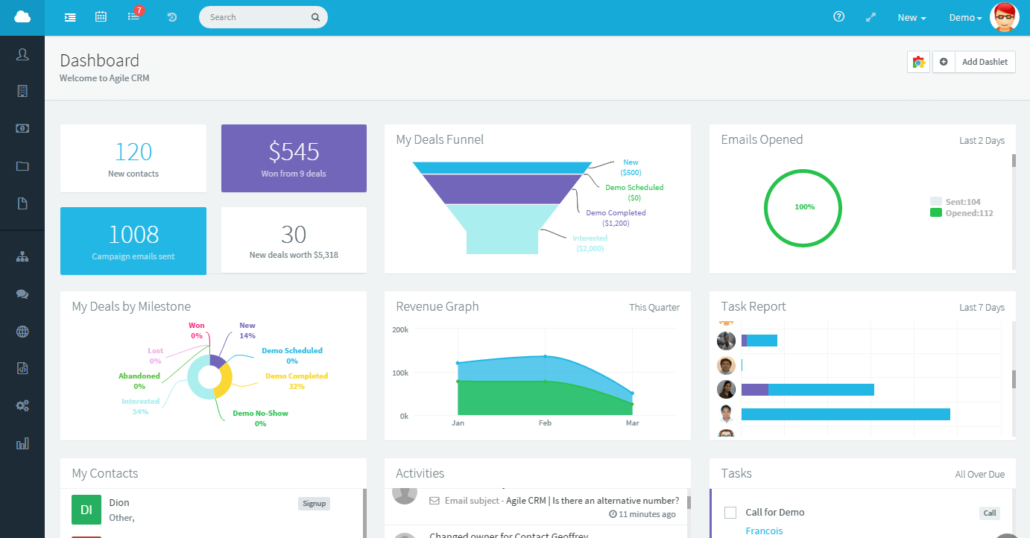
What makes Agile CRM a good Zoho alternative?
With a modest 4.0 rating on G2, 4.1 on Capterra, and Gartner, this CRM has a good foundation that creates numerous options for fluidity and control of CRM automation benefits.
With its ease of use, the multitude of features, and a decent level of customization available, Agile CRM has proven to be a really solid all-in-one CRM with a great API for many users on G2.
Another great aspect of the CRM is that it offers a free plan, which as David wrote in his reviews on Capterra offers a “good amount of flexibility for a start-up to fully integrate the CRM for zero out of pocket.”
Price
This CRM has a free package that can be used by up to 50,000 users. You can refer either their pricing page for more information, or the structure below for a quick overview –
- Free – $0 per user/month (10 users)
- Starter – $8.99 per user/month
- Regular – $29.99 per user/month
- Enterprise – $47.99 per user/month
Cons
While this CRM is great for its features and price tag, the learning period and implementation period are quite long. With not-so-great onboarding processes to the CRM, Jonas, a Sales Manager of a mid-market company, took it to G2 to type out his woes.
Another problem that is a common theme of the CRM is that while the free version of the software seems to be running quite well, the paid ones are reported to be riddled with bugs. One such issue was reported in a review by a G2 user, who said “Sending mass emails doesn’t work and the promised date for a fix came and went. The calendar link function used to work but suddenly broke months ago and has never been fixed.”
If you are not too bothered by a long and difficult learning curve and are a small business, then this CRM is a pretty solid choice for you!
7. Scoro
Scoro is a cloud-hosted business mangement software developed for small to medium-sized firms, notably those in consultancy, advertising, and information technology sectors. Work tracking and scheduling, collaboration, client relations management, project management, billing and quotation dashboard, and sophisticated reporting are some of the features offered by the software.
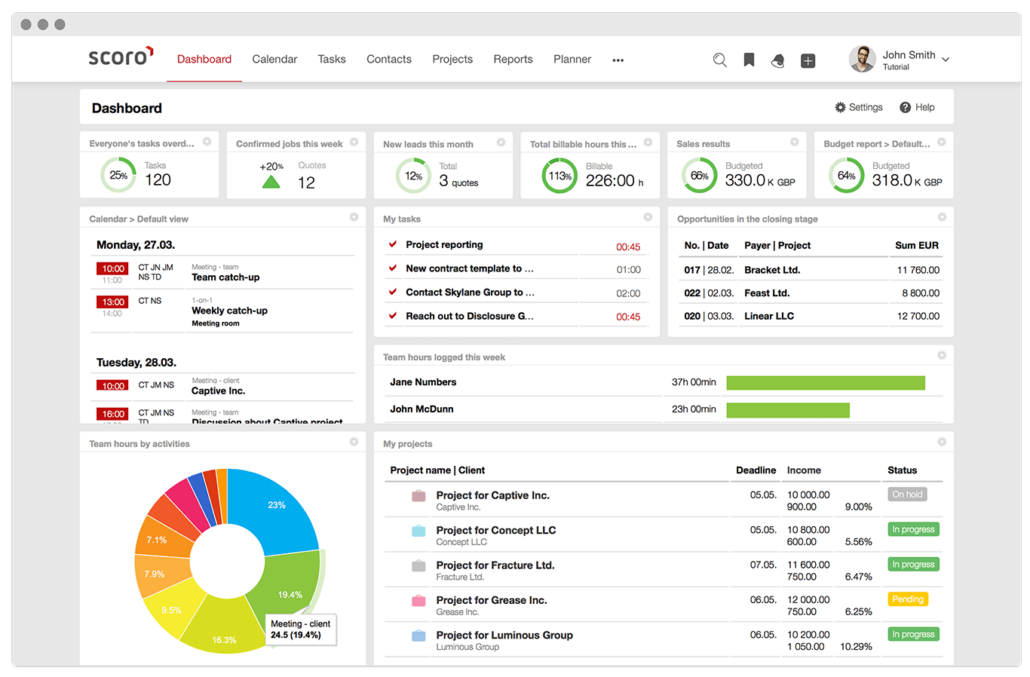
What makes Scoro a good Zoho alternative?
This CRM has garnered a high average rating of 4.5 on G2 and 4.6 on Capterra. One of the biggest reasons why companies are investing in Scoro is the platform’s customizability and the highly satisfying User-Interface.
Another thing to love about this CRM is its organizational structure, which is designed to make the software very efficient to use. A reviewer on G2 even said that his favourite bit about the CRM was that “different modules are all logically connected and easy to navigate. I also love how you can tap on anything and be redirected to another section of Scoro to further work on what you tapped.”
Price
Scoro offers 4 different price points for its various features. The highest paid feature has not been disclosed on their pricing page, but you can refer to the structure below to get an idea of the packages available.
- Essential – $26 per user/month
- Standard – $37 per user/month
- Pro – $63 per user/month
- Ultimate – Custom pricing
Cons
One of the biggest disadvantages of Scoro is that unlike other CRMs it does not have reminders for your sales team.
Another major issue is the lack of extensive reporting features. As a user on G2 put on their reviews, “The major let down is the reports section. It is extremely limited. Some reports are just impossible to produce due to way the report system is built.”
If you are looking for a simple sales solution which is not very feature-extensive, then this CRM is a really good choice for your business, especially if you are a company that is starting out and don’t need extensive reporting.
8. Apptivo
Apptivo is a business application package that includes CRM software and other tools for managing sales, projects, contracts, and supply chains. Apptivo provides sales teams with tools like sales monitoring, sales planning, and lead capture, but this only scrapes the surface of the suite’s potential. Businesses may pick how many Apptivo applications to utilise based on their size and demands.
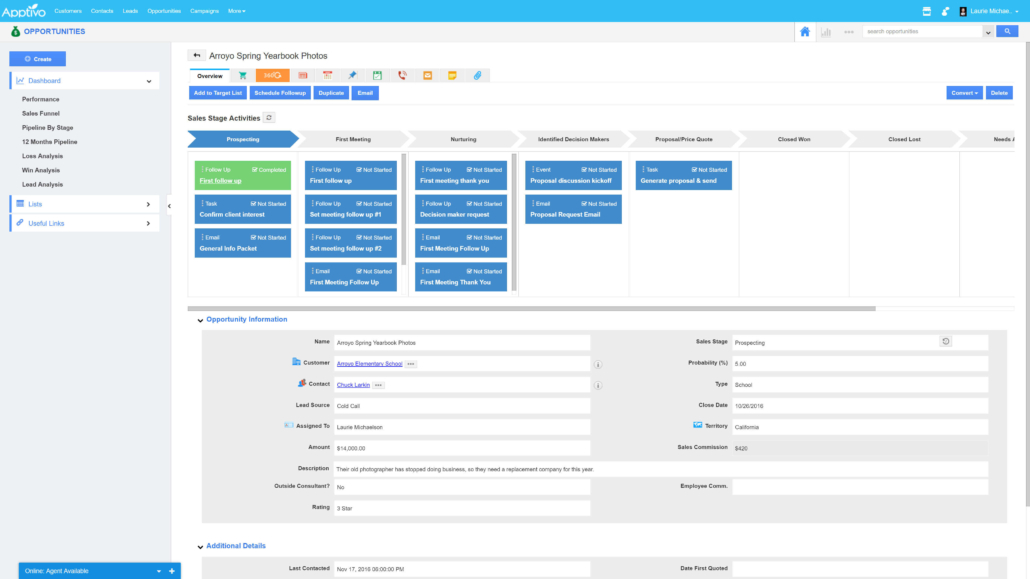
What makes Apptivo a good Zoho alternative?
With this CRM having an average rating of 4.4 on G2 and Capterra, and 4.2 on Gartner, one of the main advantages that is has over Zoho is the fact that it does not place any storage limit on emails and other records.
Another great feature of the CRM is the fact there is a short learning period. Users can start using the CRM software almost instantly.
Price
Apptivo is cheaper than Zoho, with its basic package starting at only $20. You can check out their pricing page or refer the structure below.
- Lite – $20 per user/month
- Premium – $30 per user/month
- Ultimate – $50 per user/month
- Enterprise – custom pricing
Cons
One of the common complaints about this CRM is that some features are really difficult to customize. As Michele L. put it on G2, “during the demonstrations it seemed they were easily configurable, out of the box, but we are learning that is not the case as we move through the implementation.”
Another aspect of the CRM that it can sometimes be very buggy and at other times work perfectly fine. “Great when it works, frustrating when it doesn’t.” is what Melani put in her review on Capterra.
Overall, this software is a solid choice for businesses that aren’t looking for just a CRM, but a set of tools to manage their businesses. If you are looking for a CRM that needs to be integrated with a lot of applications, then this might be the best choice.
9. Insightly
Insightly CRM is an excellent customer relationship management tool, particularly for start-ups and small organisations. It’s a user-friendly CRM application with a terrific design and feel. Insightly, albeit less feature rich than Zoho, offers solutions for marketing automation, project management, and customer support.
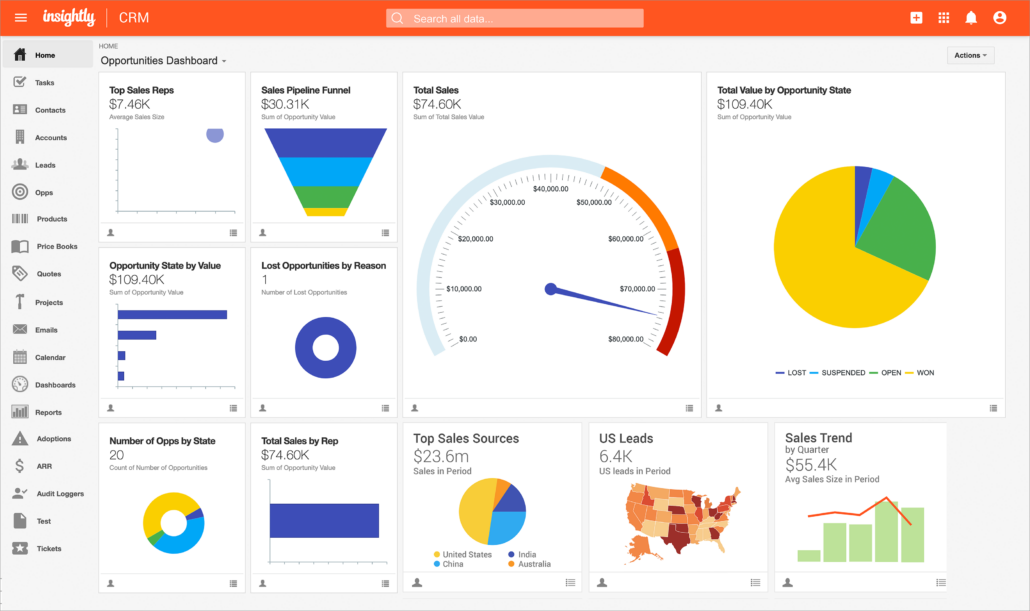
What makes Insightly a good Zoho alternative?
With an average rating of 4.2 stars out of 5 from Gartner, Capterra, and G2, one of the features that make this CRM an excellent choice is, as Kathy puts it in her review on G2, how it is “Easy to use.”
Another great aspect of Insightly is that it offers very efficient workflows and according to a Gartner review, it “Creates great opportunities for lead generation to closing and service.”
Price
Insightly is slightly more expensive than Zoho, with its basic package starting at $29. You can check out their pricing page, or refer to this structure:
- Plus – $29 per user/month
- Professional – $49 per user/month
- Enterprise – $99 per user/month
Cons
One of the biggest disadvantages is the fact that it provides very limited features when compared to other CRMs at the same price. Another problem in a review put on Gartner talked about how Insightly is “extremely poor with the automation and integration capabilities.”
Another thing that the CRM needs improvement is the customer support. As pointed out by a customer on G2, Insightly apparently provides “NO proactive support for the product.”
Overall, this CRM is a great Zoho alternative if you want an easy-to-use CRM targeted for SMBs.
10. Bitrix24
Bitrix24 is an online workspace that provides resources to help you manage your business more efficiently and effectively. They provide solutions for task and project management, chats, video conferencing, website development, telephone, CRM marketing and analytics, and much more. Bitrix24 is accessible via a traditional browser version, desktop app, or mobile app, and elegantly consolidates everything into a single online service that is totally interconnected.
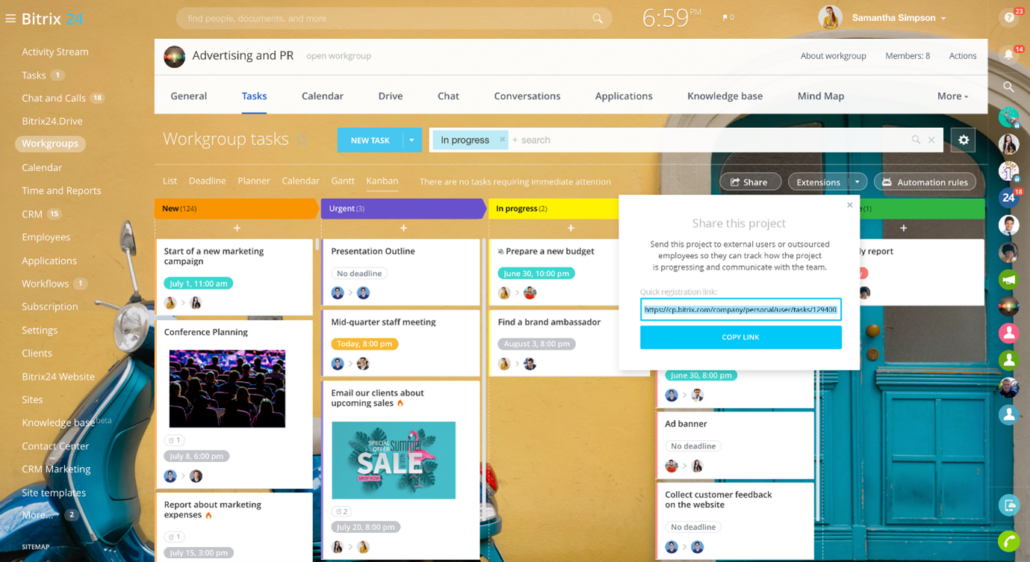
What makes Bitrix24 a good Zoho alternative?
With a solid 4.2 stars on Gartner, 4.2 on Capterra and 4.1 on G2 and its adaptability to professional requirements, it is certainly a good alternative to Zoho.
One of the better features of Bitrix24 is, as a reviewer on G2 put it, the CRM is a “Great cloud collaboration platform and excellent project management tool.“
Another reviewer, Noemi, also pointed on G2 that she likes the “corporate part of Bitrix24 because, as a project manager, we can have our own website for each project where I can categorize all contact.”
Price
Bitrix24 offers a free plan, along with four other packages depending on the number of features. You can check their pricing page, or refer to the structure below.
- Free – $0 per user/month
- Basic – $61 per 5 user/month
- Standard – $124 per 50 user/month
- Professional – $249 per 100 user/month
- Enterprise – $499 per 250 user/month
Cons
One of the not-so-nice things about this CRM that lets it down is the User Interface. A lot of reviewers on G2 wrote their complaints on the site, with one user even typing, “No matter how long you use it, you will still end up confused trying to find different options on the platforms.”
Another disappointing aspect of this CRM is its reporting features, with Sarla even taking to Capterra to type “Bitrix24 – Team Lacks Sensitivity on Custom Reports – Highly Irresponsible Team” in her review.
While this is a good CRM, you need to have prior expertise and experience before investing in it. If you are confident in setting up CRM processes and workflows, the multitude of possibilities provided by Bitrix24 may rapidly become overwhelming, therefore it is best to start with something simpler.
I hope that this list of ten alternatives to consider before investing in Zoho was helpful to you. We hope that you were able to consider a proper CRM that is best suited for your business.
Here at LeadSquared, we can help you find a solution tailored specifically for your business’ needs. To learn more about the benefits we can provide your company, schedule a call with our experts!
Criteria for Evaluating CRM Alternatives
Selecting the optimal CRM requires a clear understanding of your specific needs and priorities. Here are key criteria to consider when evaluating Zoho CRM alternatives:
User Friendliness
Intuitive interfaces and user-friendly features are essential for maximizing user adoption and streamlining workflows. Look for a CRM that offers a clean layout, clear navigation, and readily available training materials.
Pricing
CRM solutions come with varying pricing structures. Consider features offered for each price tier and choose a solution that aligns with your budget and business needs. Freemium models or tiered pricing plans with clear value propositions can be attractive options.
Customizability
A CRM should adapt to your specific business processes, not the other way around. Look for a CRM that allows customization of workflows, dashboards, and reporting functionalities to ensure it seamlessly integrates with your existing workflows.
Reporting Features
Robust reporting tools enable you to analyze customer data, track key metrics, and gain valuable insights to inform your sales and marketing strategies. Prioritize a CRM with comprehensive reporting functionalities that cater to your specific data analysis needs.
Integration Capabilities
A CRM’s ability to integrate with other business applications like marketing automation tools, accounting software, or project management platforms is crucial for a unified data ecosystem.
Customer Support
Reliable and responsive customer support is essential for troubleshooting technical issues, maximizing software utilization, and ensuring a smooth user experience. Look for a CRM that offers multiple support channels (phone, email, and live chat) and has a reputation for prompt and helpful assistance.
Security and Data Privacy
Customer data security should be a top priority. Choose a CRM with robust security measures, such as data encryption, access controls, and compliance with relevant data privacy regulations (e.g., GDPR, CCPA).
Why Should You Look for Zoho Alternatives?
Zoho CRM, a part of Zoho Suite launched in 2005, is made for businesses to manage their sales, marketing, and customer service in one place.
Forty-five applications, over a decade and a half later, Zoho ranks third in terms of CRM market share.
With an average rating of 4.2 on G2, Capterra, and Gartner, Zoho provides many integrations and customizations that suit a large variety of businesses.
While Zoho CRM has carved a niche for itself, businesses should consider exploring alternatives for several reasons:
- Learning Curve: Zoho CRM users find the software complex and require significant training to navigate its functionalities effectively. This can hinder user adoption and slow down workflows.
- Limited Reporting: While Zoho offers basic reporting features, in-depth data analysis capabilities can be lacking. The reporting tools were insufficient for their needs, limiting their ability to glean valuable insights from customer data.
- Integration Challenges: Zoho integrates with various business applications, but seamless integration can be inconsistent. This can create data silos and hinder the flow of information across different platforms.
Though this CRM is quite suitable for businesses looking to manage their operations, one of its major drawbacks is the long learning period and the complexity of usage.
These limitations can lead to inefficiencies, user frustration, and ultimately hinder your CRM’s effectiveness. We think exploring an alternative to Zoho CRM can reveal a solution that better aligns with your specific needs and growth aspirations.
FAQs
While Zoho offers a lot of features, its large learning curve and difficulty in implementation makes other CRMs like LeadSquared a great choice.
Zoho has limited customer support, requires a large learning period, is difficult to implement, and though they offer many features, none of them are in-depth.
While the topic is subjective, Zoho is suited for relatively smaller businesses and Salesforce for larger ones. However, there are plenty of other CRMs like LeadSquared that are making their presence felt in the CRM Market.
Zoho provides a range of software for different business purposes. CRM is one of the products in its suite of web-based business tools.
A technology platform servicing financial technology companies fell victim to a cyber-attack, which was thought to be due to a vulnerability in Zoho’s ManageEngine product.









